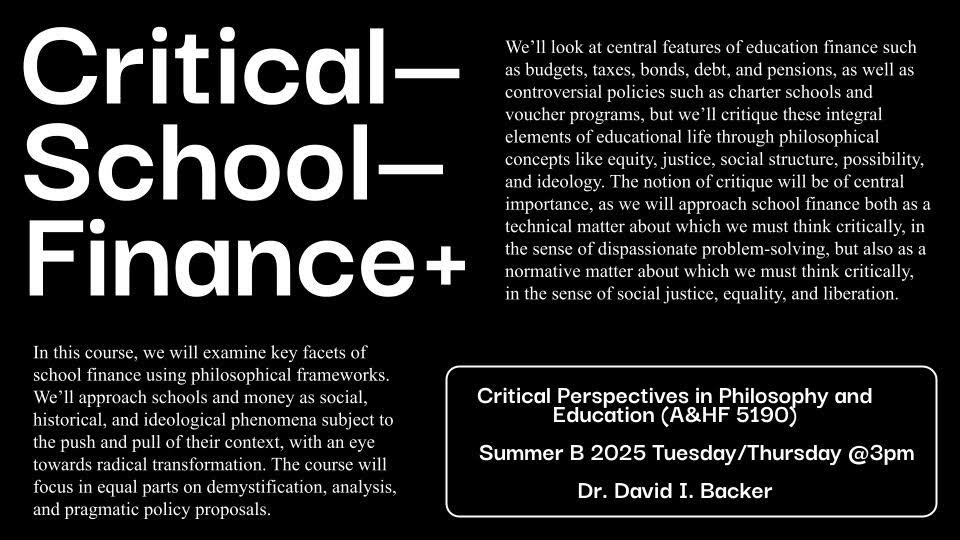Critical school finance (the course!)

At the beginning of this year, geographer Ee-Seul Yoon and I co-edited a special issue of the Journal of Educational Administration Quarterly called “Critical Issues in School Finance and Privatization: Considerations for Future Directions.”
The special issue focuses on the theme of critical school finance generally, but specifically on issues surrounding facilities financing. There’s a bunch of great articles in the issue from leaders in that field looking at school finance from Australia, Manitoba, California, Philadelphia, and beyond.
In one of the pieces, historian Esther Cyna and I sketch out a framework for critical school finance. In another, Camika Royal and I look at what we call the “toxic financing” behind Philadelphia’s toxic schools, focusing on the $3.6 billion in interest and fees the district paid over a nearly 30 year period.
Each of these pieces rely on a philosophical approach to school finance that I’ve been working out as part of my research into schools and money. And this summer I’m going to be teaching a seminar at Teachers College, Columbia University in the Philosophy and Education program on this subject.
If you know any graduate students in New York City (they can be attending any programs in the consortium) feel free to forward the course along! I’m looking for some critical school finance researchers interested in using critical-theoretical frameworks to understand the nitty-gritty of schools and money.
Above is a flyer for the course. Below is a draft of the description for the course from my syllabus. If you have thoughts about what I should include in terms of readings please email me!
A&HF 5190: "Critical Perspectives in Philosophy and Education": Critical School Finance
Description
This course will examine key facets of school finance using a philosophical and theoretically-informed framework. The course approaches schools and money as a social, historical, and ideological phenomenon subject to the push and pull of its context, which can be differently understood (and therefore influenced) through philosophical concepts. The course looks at central features of education finance such as budgets, taxes, bonds, and pensions, as well as controversial policies such as charter schools and voucher programs, but understands these integral elements of educational life through philosophical concepts like justice, critique, social structure, and ideology.
The notion of critique will be of central importance, as we will approach school finance both as a technical matter about which we must think critically, in the sense of dispassionate problem-solving, but also as a normative matter about which we must think critically, in the sense of social justice, equality, and liberation.
The course will focus in equal parts on demystification, analysis, and pragmatic policy proposals. It will also be interdisciplinary given the subject matter, drawing from the fields of history, sociology, economics, policy, geography, political science, law, as well as, of course, education research and philosophy.
The course is oriented for those who want to know more about school finance generally; those who are school finance experts but are interested in the social, political, and philosophical significance of school finance; those involved in union or movement efforts to create change at the school, district, municipal, state, or federal levels; those interested in critical theory’s applications to the material conditions of schooling.